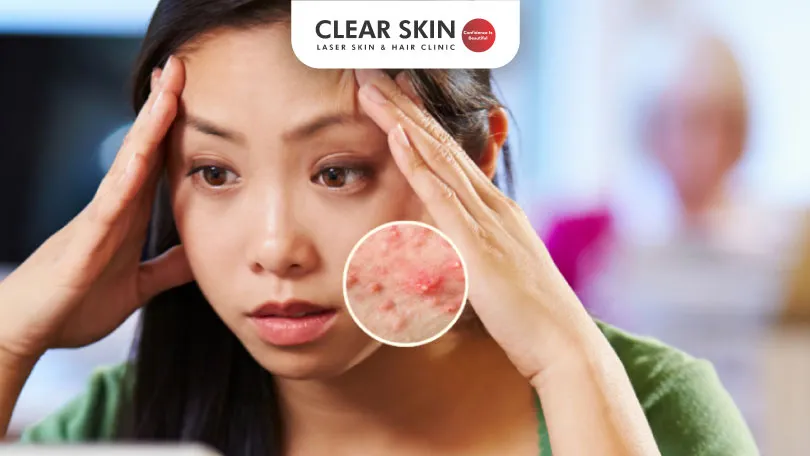How are Acne and Stress Related ?
Reviewed By: Dr Dhananjay chavan
Updated on: 8th April, 2023

The relationship between stress and acne might appear obvious. But often, many misunderstand it. Stress doesn’t directly cause acne. It worsens acne. According to research, stress slows down the acne-healing process.
Acne is one of the most widespread skin concerns. While it is believed to be the cause of many factors, stress is every day. Now, the word stress may trigger questions like where stress acne is located, what does stress acne look like, how to treat acne, why I am getting stress pimples, etc. So, let’s delve into acne and stress.
Table Of Content
- How Does Stress Affect Acne?
- Where is Stress Acne Located?
- What Does Stress Acne Look Like?
- How to Treat Stress Acne?
- conclusion
How Does Stress Affect Acne?
The relationship between stress and acne might appear obvious. But often, many misunderstand it. Stress doesn’t directly cause acne. It worsens acne. According to research, stress slows down the acne-healing process.
Slower healing refers to enduring acne pimples and being more vulnerable to becoming severer with time. Besides, it also means that acne is more visible at a point in time as each pimple takes longer to heal.
Some other factors include the following.
Hormones: Neuropeptides and hormones involved in stress reactions trigger the sebaceous glands to produce oils.
Inflammation: Stress may result in the inflammation of the sebaceous glands.
Skin’s Defenses: Stress hormones may negatively impact the skin’s antimicrobial defenses
Where is Stress Acne Located?
So, where are stress breakouts located? They usually are seen in the oiliest areas of the face like the nose, chin, and forehead. The person’s T-zone might look oilier and more congested as well. Stress causes clusters of pimples at once, as in the case of hormonal changes, pimples pop up one at a time.
What Does Stress Acne Look Like?
Stress acne can look like a combination of whiteheads, blackheads, pus pimples, and red bumps. Even if some people aren’t as vulnerable to stress, long spells of stress can lead to acne. But people who get acne due to genetics and suffer from it regularly can have severe breakouts during stressful situations.
How to Treat Stress Acne?
As said earlier, managing stress plays a crucial role in reducing stress acne. So, here’s how to manage stress to keep stress-related acne at bay.
- Getting Adequate Rest: About seven to eight hours of quality sleep is necessary to help the body relax, rejuvenate and keep stress away.
- Practicing Yogasan or Meditation: Indulging in healthy practices like meditation or Yogasana can enhance physical and emotional health and prevent stress.
- Exercising Regularly: Regular exercising can enhance blood circulation, keep your body active and help you manage stress efficiently.
- Following a Healthy Diet: Including healthy and nutritious foodstuffs, including vitamins, proteins, and minerals in adequate quantities, can contribute to your health positively.
- Consulting a Dermatologist: It is prudent to consult a dermatologist to know what exercises and diet suit your body to reduce stress.
We hope this article answered a few questions, like how to treat acne and others about the relationship between stress and acne. Connect with us for a more specific consultation about stress-related acne. Our dermatologists will diagnose your case and identify and recommend the best-suited treatment options for stress-driven acne.
Do You Know?
Roughly 250 Patients Are Treated
Everyday By These Dermatologists
(You are one click away from flawless skin)
Meet Our Dermatologist!
Conclusion
Stress plays a significant role in exacerbating acne by affecting hormones, inflammation, and the skin’s defenses. Stress-related acne commonly appears in the T-zone, presenting as a mix of whiteheads, blackheads, and red bumps.
Managing stress through adequate rest, regular exercise, a healthy diet, and practices like meditation can help mitigate its impact on the skin. For personalized advice and effective treatment options, consulting a dermatologist is essential.
They can provide tailored recommendations to address stress-related acne effectively. Contact our specialists to start your journey towards clearer skin.
Further Reading
Is Tretinoin Cream Safe for Melasma? Tips and Usage Guide
Discover how tretinoin cream can safely treat melasma.
Unveiling the Potential of Face Packs for Acne Scars
Discover how homemade and customized face packs can help lighten acne marks and rejuvenate your skin.
Home Remedies for Acne Scars
Effective Home Remedies for Acne Scars
Salicylic Acid: Your Ultimate Guide to Banishing Acne Scars
Salicylic acid helps fade acne scars by exfoliating the skin and promoting cell renewal. Discover its benefits, effectiveness, and how to use it safely.
Have thoughts? Please let us know
We are committed not only to treating you, but also educating you.






